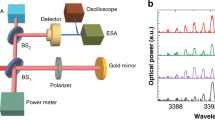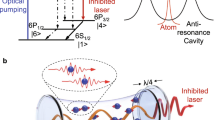Abstract
IN a series of experiments to investigate threshold retinal damage produced by CW helium–neon lasers (wavelength = 632.8 nm), we have found that lasers with identical beam divergence and output powers but different amplifier/cavity parameters produce different amounts of retinal damage. The source of this discrepancy has been traced to mode locking in one of the lasers used.
This is a preview of subscription content, access via your institution
Access options
Subscribe to this journal
Receive 51 print issues and online access
$199.00 per year
only $3.90 per issue
Buy this article
- Purchase on Springer Link
- Instant access to full article PDF
Prices may be subject to local taxes which are calculated during checkout
Similar content being viewed by others
References
Marshall, J., and Mellerio, J., Exp. Eye Res., 6, 4 (1967).
Bergqvist, T., Kleman, B., and Tengroth, S., Acta Ophthalmol., 44, 853 (1966).
Vassiliadis, A., Rosan, R. C., Peabody, P. R., Zweng, H. C., and Honey, R. C., Stanford Research Institute, Report for USAF, No. Af 33 (615)–3060 (1966).
Marshall, J., and Mellerio, J., Exp. Eye Res., 7, 225 (1968).
Code of Practice for Laser Systems (Ministry of Technology, 1969).
Author information
Authors and Affiliations
Rights and permissions
About this article
Cite this article
SMART, D., MANSON, N., MARSHALL, J. et al. New Ocular Hazard of Mode Locking in CW Lasers. Nature 227, 1149–1150 (1970). https://doi.org/10.1038/2271149a0
Received:
Revised:
Issue Date:
DOI: https://doi.org/10.1038/2271149a0
Comments
By submitting a comment you agree to abide by our Terms and Community Guidelines. If you find something abusive or that does not comply with our terms or guidelines please flag it as inappropriate.



